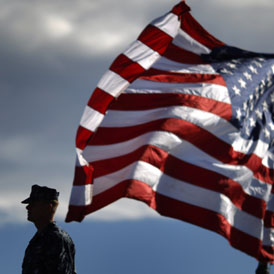Somali terror suspect appears before US civilian court
A Somali man is taken to the US to face charges of assisting terror groups in Yemen and Somalia, after being detained on a US Navy ship for more than two months.

Ahmed Abdulkadir Warsame has pleaded not guilty to nine charges, including providing material support for the last four years to al-Shabaab in Somalia and al-Qaeda in the Arabian Peninsula (AQAP), two groups designated by Washington as terrorist organisations.
According to the charges, Warsame also worked to broker a weapons deal with AQAP on behalf of al-Shabaab.
It’s believed he was captured somewhere in the Gulf of Aden by US forces on April 19, and faced questioning by US military interrogators on board a naval vessel there “for intelligence purposes for more than two months,” US prosecutors said in a statement.
Warsame is the first foreign terrorism suspect the Obama administration has captured outside the US but moved to the US for trial.
Channel 4 News’ Foreign Affairs Correspondent Jonathan Rugman believes Warsame’s case is particularly revealing.
“The case is intriguing, partly because it provides some of the first indications that extremists in Somalia and Yemen may be linking up; and partly because Ahmed Abdulkadir Warsame’s arrival for trial in New York around midnight on July 4th reignites the debate about the legal justification for flying military detainees into US jurisdiction from overseas,” Rugman said.
He adds that if Warsame is found to be a courier between al-Qaeda and al-Shahbaab it may signify “the birth of a maritime version of the dangerously porous ‘Afpak’ border, this time between the Horn of Africa and Arabia.”
Read more: Is Somalia now playing the Pakistan to Yemen's Afghanistan? Our Foreign Affairs Correspondent Jonathan Rugman looks at the issues.
The question has to be whether Somalia is now playing Pakistan to Yemen's Afghanistan, or vice versa - whether we are witnessing the birth of a maritime version of the dangerously porous "Afpak" border, this time between the Horn of Africa and Arabia.
Suspect rights
Officials told reporters Warsame’s detention was justified by the laws of war and that he was treated humanely.
A US official told reporters that Warsame’s questioning was conducted under the rules of the US Army Field Manual, which places limits on interrogation techniques and complies with the Geneva Convention.
Members of the High Value Interrogation Group – comprised of CIA, FBI and Defence Department staff – interrogated him, an official told AFP on condition of anonymity.
Unnamed US officials told the New York Times that because interrogators were seeking military intelligence, Warsame was not given what is known as a “Miranda warning”, which would be obligatory for a suspect being questioned by US police. Failure to give a Miranda warning advising suspects of their rights to have a lawyer and to remain silent can make any testimony inadmissable as evidence.
But after two months in detention Warsame was questioned by a separate group of interrogators who did apparently deliver a Miranda warning. Warsame is reported to have waived his right to remain silent, meaning that his subsequent statements would likely be admissible in court.
Policy debate
Warsame’s case comes amid a debate in the US over how terror suspects should be tried.
The House of Representatives – one of the two Houses of Congress – has already passed a bill that could prohibit the transfer of military detainees into the United States.
Republican Howard McKeon, said: “The transfer of this terrorist detainee directly contradicts Congressional intent and the will of the American people,”
Last week, Vice Admiral William H. McRaven, who was until recently in charge of the military’s Joint Special Operations Command, told a Senate hearing that captured suspects have been kept on Navy ships until the Justice Department can build a case against them, or they are transferred to other countries for detention.
Drone strikes
It’s not known if Warsame’s intelligence led to drone strikes in Somalia on June 23.
Although drones have been used in Somalia for surveillance before, the strikes appeared to have been the first time they have been used for attack in Somalia.
It means President Obama has now expanded American use of drone strikes to three new countries – Libya, Yemen, and Somalia – and has increased their use in Afghanistan, Pakistan, and Iraq.
This has led to criticism that the administration favour killing militant suspects rather than capturing and using due process to try them.
However, some senior officials have suggested that there should be a greater emphasis on trying suspects.
Army Gen. David Petraeus, in his confirmation hearings to become CIA director, said that he believed the U.S. should find a way to capture and detain militants and hold them somewhere other than Guantanamo.
If convicted Warsame could face life in prison.

